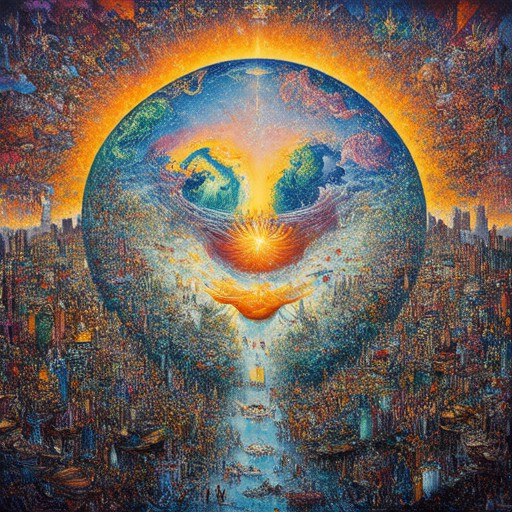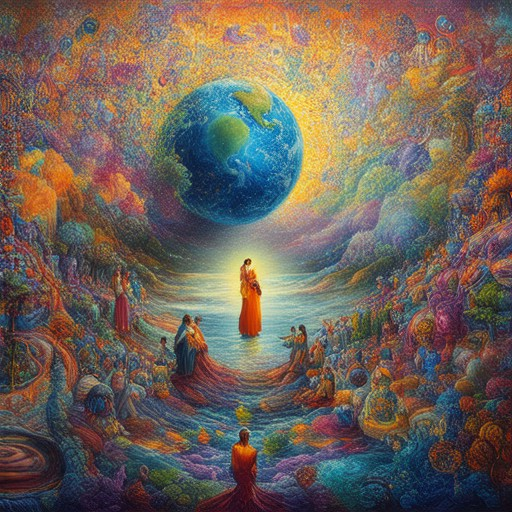Embark on a captivating journey through the rich tapestry of human diversity as we explore the world’s most unique cultures. From the vibrant festivals of Asia to the ancient traditions of Europe, every corner of the globe offers a fascinating glimpse into the hearts and souls of its people. This guide invites you to dive deep into the customs, beliefs, and practices that define our global heritage, offering insights into how cultures shape our lives and connect us across borders. Whether you’re a curious traveler, a student of anthropology, or simply someone eager to broaden your horizons, this exploration promises to enrich your perspective and inspire your sense of adventure.

Cultural Activities
Here are some notable cultural activities that showcase diverse traditions and practices:
- Festivals and Celebrations: Events like Carnival in Rio de Janeiro, Mardi Gras in New Orleans, and Oktoberfest in Germany highlight rich cultural heritage through parades, music, and food.
- Traditional Practices: Rituals such as tea ceremonies in Japan, sandalwood carving in Hawaii, and potluck dinners in many Indigenous communities offer deep insights into cultural values.
- Performing Arts: Theatre productions, dance performances, and musical concerts provide platforms for artists to share stories and emotions across cultures.
- Visual Arts: Paintings, sculptures, and installations allow creators to express cultural identity and perspectives, often explored in galleries and museums.
- Literary Arts: Book clubs, poetry readings, and writing workshops foster appreciation for literature, enabling discussions on cultural themes and narratives.
- Culinary Arts: Cooking classes, food festivals, and street markets celebrate culinary traditions, offering tastes of different cuisines and cooking methods.
- Historical and Educational Events: Conferences, seminars, and workshops provide opportunities to learn about cultural history, philosophy, and societal evolution.
- Community-Based Activities: Volunteering, neighborhood gatherings, and cultural exchange programs strengthen community bonds and promote cross-cultural understanding.
These activities not only entertain but also educate, connecting people through shared experiences and traditions.
World Culture Day Activities
Here are some creative and engaging ways to celebrate World Culture Day:
- Cultural Exchange through Food
Host a potluck where employees can bring dishes from their home countries. This not only introduces colleagues to new cuisines but also fosters cross-cultural conversations. - Global Traditions Display
Set up a booth or wall displaying flags, traditional clothing, and artifacts from various cultures. Include a brief description of each item to educate participants. - Language Learning Session
Offer a language workshop where team members can learn basic phrases in different languages. This promotes inclusivity and appreciation for diversity. - Film Screening
Watch a documentary or movie that showcases a different culture each year. Follow up with a discussion session to explore themes and shared experiences. - Collaborative Playlist Creation
Create a global music playlist featuring songs from around the world. Share it company-wide and host a listening party to celebrate musical diversity. - Cultural Trivia Challenge
Organize a trivia game focused on global facts, traditions, and history. Prizes can be awarded for the winning team, adding an element of fun and competition. - Workshop Series
Host workshops on topics like calligraphy, traditional dance moves, or crafting techniques inspired by different cultures. Hands-on activities make learning more interactive. - Virtual Cultural Immersion
For remote teams, organize a virtual tour or live-streamed event showcasing a cultural landmark from a different country. Include interactive elements like Q&A sessions with locals. - Book Club Discussion
Choose a book from a different culture and discuss it in a group setting. This encourages reflection on cultural differences and similarities. - Charity Event
Partner with a global charity and host a fundraising event themed around different cultures. Participants can donate or participate in activities to support causes aiding communities worldwide.
These activities promote cultural awareness, teamwork, and appreciation for diversity, making World Culture Day a meaningful and memorable celebration.

What Are Examples of Cultures Around the World?
Cultures are distinct ways of life, beliefs, customs, arts, and social behaviors passed down by groups of people and maintained through generations. Here are a few notable examples:
1. Japanese Culture
The Japanese culture is renowned for its rich history, art, and traditions. Key elements include tea ceremonies, calligraphy, and festivals like hanami and kaiseki dining.
2. Egyptian Culture
Egyptian culture is deeply rooted in ancient history, with influences from pharaonic times, the Middle Ages, and modern-day societal norms. It is known for its pyramids, hieroglyphs, and desert oasis traditions.
3. Chinese Culture
Chinese culture encompasses a vast array of traditions, including martial arts, cuisine, architecture, and philosophy. Festivals like Lunar New Year and the art of calligraphy are central to its identity.
4. Indian Culture
Indian culture is a vibrant mix of languages, religions, dances, and cuisines. It includes the diversity of its many states, each with unique customs, and the influence of Hinduism, Buddhism, and Islam.
5. African Cultures
African cultures are characterized by their rich oral traditions, music, and art. Many African societies emphasize community, family values, and a deep connection to nature.
6. European Cultures
European cultures vary widely from country to country, but common elements include a focus on education, literature, and historical preservation. The EU’s efforts to promote cultural exchange highlight the region’s diversity.
7. Middle Eastern Cultures
Middle Eastern cultures are marked by a blend of Arab, Persian, and Berber influences. Key aspects include hospitality, poetry, and the significance of family and community gatherings.
8. Latin American Cultures
Latin American cultures are deeply influenced by indigenous traditions, Spanish colonialism, and African contributions. They are known for their vibrant festivals, music, and culinary practices.
Cultural diversity enriches our global society, offering unique perspectives and traditions that shape our collective understanding of the world. Exploring these cultures helps foster empathy and appreciation for the complexities of human life.
For more insights into global cultures, visit Bending Borders to discover travel stories and cultural explorations from around the globe.

Exploring Cultures
Exploring cultures involves delving into the unique traditions, beliefs, customs, and lifestyles of various societies around the globe. This enriching experience allows individuals to gain a deeper understanding of human diversity and fosters empathy and appreciation for different ways of life. Here’s a structured approach to effectively explore cultures:
Methods of Exploration
- Travel and Immersion : Visiting foreign countries provides firsthand exposure to local customs, languages, and traditions. Interacting with locals and participating in cultural activities offers an authentic experience.
- Education and Research : Studying cultural history, art, and literature through books, documentaries, and academic resources can offer valuable insights into different civilizations.
- Cultural Events and Festivals : Attending celebrations like festivals, holidays, or national events allows participants to observe and engage in traditional practices.
- Connecting with People : Engaging with individuals from diverse backgrounds through social interactions, community groups, or international organizations can provide personal stories and perspectives.
- Online Resources and Virtual Experiences : Utilizing platforms offering virtual tours, language classes, and cooking workshops can offer accessible ways to explore cultures remotely.
- Art and Media : Consuming films, music, literature, and art from different regions can highlight cultural values and narratives.
Benefits of Cultural Exploration
Exploring cultures enhances cross-cultural communication skills, broadens worldview perspectives, and promotes inclusivity. It challenges stereotypes and encourages critical thinking, making individuals more adaptable and open-minded.
Recommended Resources
For those eager to dive deeper, consider exploring these resources:
– Bending Borders : A platform dedicated to sharing global travel stories and cultural insights.
– World Packers : Offers guides and forums for budget travelers seeking cultural immersion.
– Cultural Travel Guide : Provides comprehensive information on cultural experiences worldwide.
By thoughtfully exploring different cultures, individuals can uncover the rich tapestry of human existence, fostering meaningful connections and a greater sense of global community.
What is the Study of the World’s Cultures Called?
The study of the world’s cultures is known as anthropology . This discipline examines human societies and cultures, past and present, focusing on their social, cultural, and biological dimensions. Anthropology is divided into several branches, including:
- Cultural Anthropology : Focuses on the study of social norms, beliefs, and customs.
- Physical Anthropology : Examines the physical characteristics of humans, including evolution and biology.
- Linguistic Anthropology : Investigates the relationship between language and culture.
Anthropologists use various methods, such as participant observation and interviews, to gather data and understand cultural practices. They often work in museums, universities, or with organizations focused on cultural preservation. The field is interdisciplinary, drawing from disciplines like history, psychology, and sociology.
Prominent anthropologists like Margaret Mead and Claude Lévi-Strauss have made significant contributions, influencing theories and research in the field. Anthropology is particularly relevant today due to globalization and migration, aiding in understanding cultural differences and fostering cross-cultural communication.
By studying anthropology, we gain insights into human behavior and societal dynamics, contributing to innovation and problem-solving across various sectors.

Examples of Cultural Tourism
Cultural tourism offers unique opportunities to explore diverse traditions, histories, and customs. Here are three notable examples:
- Bending Borders : A platform dedicated to cultural exploration, offering travel stories, destination guides, and insights into global cultures. Their mission is to bridge cultural divides through storytelling and travel experiences. Visit Bending Borders
- World Heritage Journeys : Focuses on visiting UNESCO World Heritage Sites, providing educational tours to iconic locations like the Great Wall of China, Machu Picchu, and ancient European ruins. Explore World Heritage Journeys
- Culinary Capitals : Organized around food and wine experiences, this initiative connects travelers with local chefs, vineyards, and artisanal producers, offering immersive cultural experiences through gastronomy. Discover Culinary Capitals
These programs highlight the rich tapestry of human culture, blending education with adventure to create unforgettable experiences.




0 Comments